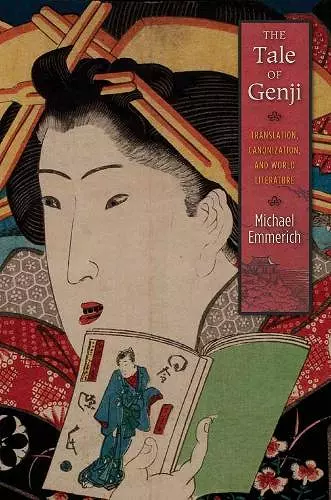The Tale of Genji
Translation, Canonization, and World Literature
Format:Hardback
Publisher:Columbia University Press
Published:18th Oct '13
Currently unavailable, and unfortunately no date known when it will be back

Tracing the canonization through translation of The Tale of Genji from the 1830s to the 1950s, Michael Emmerich rewrites the early modern and modern history of the work, illuminating the intricate process by which it came to be recognized as a classic of both Japanese and world literature.
Michael Emmerich thoroughly revises the conventional narrative of the early modern and modern history of The Tale of Genji. Exploring iterations of the work from the 1830s to the 1950s, he demonstrates how translations and the global circulation of discourse they inspired turned The Tale of Genji into a widely read classic, reframing our understanding of its significance and influence and of the processes that have canonized the text. Emmerich begins with an analysis of the lavishly produced best seller Nise Murasaki inaka Genji (A Fraudulent Murasaki's Bumpkin Genji, 1829-1842), an adaptation of Genji written and designed by Ryutei Tanehiko, with pictures by the great print artist Utagawa Kunisada. He argues that this work introduced Genji to a popular Japanese audience and created a new mode of reading. He then considers movable-type editions of Inaka Genji from 1888 to 1928, connecting trends in print technology and publishing to larger developments in national literature and showing how the one-time best seller became obsolete. The study subsequently traces Genji's reemergence as a classic on a global scale, following its acceptance into the canon of world literature before the text gained popularity in Japan. It concludes with Genji's becoming a "national classic" during World War II and reviews an important postwar challenge to reading the work after it attained this status. Through his sustained critique, Emmerich upends scholarship on Japan's preeminent classic while remaking theories of world literature, continuity, and community.
The Tale of Genji is a brilliantly sustained work of literary criticism, quite the most engrossing book in the field of Japanese literature I have read in years. It is a rare book, one that is sure to have a profound and lasting impact. -- Gaye Rowley, Waseda University A stunning tour de force, The Tale of Genji reveals the manner in which the work was 'replaced' by various texts and how it was made, from the late nineteenth century, into a world classic both in and outside Japan. Throughout, Michael Emmerich engages with translation studies, reception theory, and current notions of world literature, writing in a transnational, translingual context. This book makes us profoundly aware of the transformation of the material Tale of Genji and reading practices in Japan from the late early modern through the postwar period, thus bridging the gap between early modern and modern literary studies as well as that between Japanese literary studies and contemporary translation studies. -- Haruo Shirane, Columbia University, author of Japan and the Culture of the Four Seasons Michael Emmerich's astute analyses and imaginative interpretations are likely to radically change our view of Japanese literature and the role translation has played in its constitution, and they expand even the notion of translation itself. This discerning study gives a refreshing look at how an Edo-period illustrated book was put together and how it functioned. Anyone interested in the visual culture of Japan should read this book. -- Yoshiaki Shimizu, Princeton University This work's profundity, clarity, intriguing revelations, and accessibility recommend it to a wide readership... Essential. Choice This is a fabulously stimulating scholarly work... a highly sophisticated study of some of the most influential productions in word and image that have sprung from the Genji... The book is highly recommended to those who want to learn about Genji "replacements" and canonization Modern Philology Groundbreaking, provocative, and broad in scope... Michael Emmerich has given us a prodigious work of scholarship on the history and aesthetics of translation, while seriously challenging us to think anew about the methods and assumptions we bring to our field of study. Monumenta Nipponica Impeccably researched and copiously illustrated. -- Paul S. Atkins Harvard Journal of Asiatic Studies
- Winner of Choice Outstanding Academic Title 2014
- Commended for Honorable Mention - PROSE Award in Literature 2013
ISBN: 9780231162722
Dimensions: unknown
Weight: unknown
512 pages